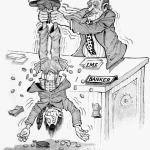The fallacy of Robin Hood Corporate Taxes: It’s society who pays in the long run.
WRITTEN BY: Emily
First, as civilised people, it’s important to remember that we reject aggression, and that taxation is aggression. It is the taking of someone else’s property by force, if necessary.
So, let’s define what a corporation is, so we may know who we’re actually taxing. The legal fiction: the “corporation”, is merely a group of contractually associated people, whose team name has a certain legal “personhood”. In reality, when you tax the “corporation”, you’re taxing the individuals who comprise it, and its customers (society). Employees suffer the tax in the form of lower wages. We pay this tax in the form of higher prices and reduced services, as some of that tax is passed on. Finally, corporate taxes reduce a company’s share value, hitting our invested pension funds.
Corporations, think Google, Starbucks and Amazon, can only do three things with their earnings:
1. Pay wages (including bonuses) to employees.
2. Pay dividends to shareholders (including pension funds).
3. Retain earnings for future expenditures, make capital investments and grow the business (employ more people).
1 and 2 are taxed as personal income tax anyway. So, in this respect, the Government is taking two bites.
As for 3: The fewer earnings a business retains, the less it can invest, expand and employ. So, less abundance, poorer quality, and fewer jobs in society.
Now, let’s look at Google, Starbucks and Amazon;
Lately, Google finds itself slandered by rabid Marxists inhabiting Westminster and media as “tax cheats”, despite obeying the law. Google has grown into an innovative commercial juggernaut, employing over 1,300+ Brits, and paying the highest wages in its industry. If a minimal corporate tax environment enabled this, why on earth don’t we cultivate it for all UK businesses?
Starbucks and Amazon have also merited similar adjectives. Are they evil? In return for good service, convenience and cheap goodies, society has voluntarily rewarded Starbucks and Amazon with profit. This incentive to keep pleasing society has seen Starbucks and Amazon grow to employ over 10,500+ Brits in jobs that otherwise wouldn’t exist in a dire economy.
Due to minimising the coercive “corporate tax”, these businesses have generated wealth in our society, providing 1,000s of jobs, and abundant, cheap, convenient and innovative services and products.
OK, what have we learned? The less corporate tax paid, the more society’s wealth grows by increased: dividends, innovation, abundance, employment and wages. And, lower prices.
What model should the UK adopt? I suggest Hong Kong, a low tax capital friendly veritable rock in the sea who, in just two-three generations, saw its agrarian society increase its wealth to arguably the wealthiest, most innovative, capitalist society in Asia! Hong Kong is still ranked 1 in economic freedom. Now, imagine how far the UK can go starting with the relative advantages of a skilled workforce, abundant land and resources. The world is our oyster, liberty is the way!
Emily Green
Food for thought:
If cigarette taxes deter smoking, will corporate taxes deter enterprise?
